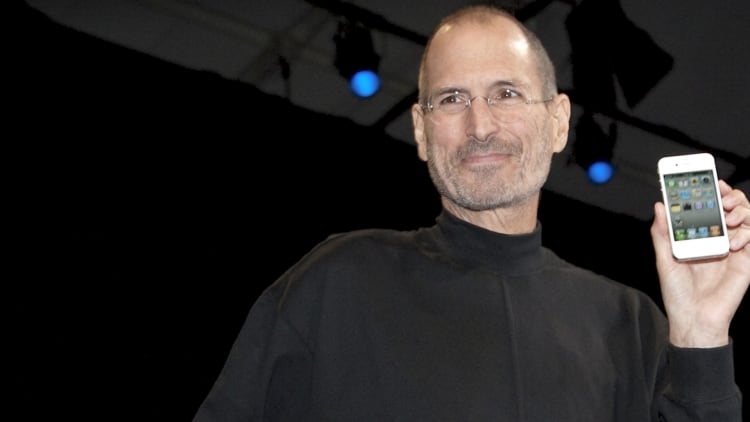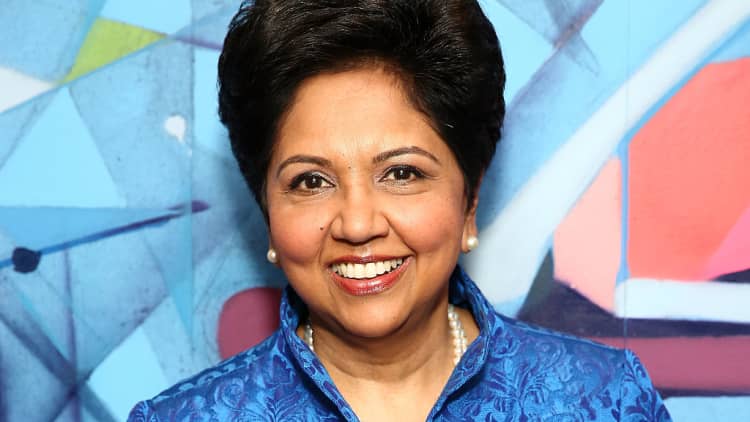Apple is expected to launch three new iPhones at its brand new Apple Park campus today. The widely anticipated Apple event, known to draw rock concert-like crowds, will be the first event held at Steve Jobs theater and is the first time the "Spaceship Campus" welcomes press and VIP outsiders.
Over 40 years after the late Steve Jobs co-founded Apple, he continues to be revered for his successful years of leading the company and the 2007 introduction of the iPhone, the company's most successful product.
But Jobs wasn't always so confident the world-changing item would be a wise investment to develop for the company.
In celebration of the iPhone's 10th anniversary this year, author and Motherboard senior editor Brian Merchant published, "The One Device: The Secret History of the iPhone." There, Merchant uncovers the details of how the smartphone came into existence and how even one of the most intelligent, powerful executives needed smart people to help him land at the right decision.
"Jobs was a powerful source of inspiration, a fierce curator of good ideas and rejector of bad ones, and a savvy and potent negotiator," Merchant tells CNBC Make It. "But the iPhone began as an experimental project undertaken without his knowledge, became an official project at the prodding of his executive staff and was engineered into being by a team of brilliant, unfathomably hard-working programmers and hardware experts."
Jobs had faith in a wide variety of talent, "from new blood to veteran hands," Merchant says. He notes that Jobs gave Scott Forstall — who would go on to create the iPhone operating system (iOS) — the ability to recruit anyone from the existing Apple staff for the new phone project.

Merchant says that Jobs was publicly resistant to the idea of Apple making a phone because he, like many other Apple engineers and executives, thought cell phones "sucked."
Merchant writes in his book: "'The problem with a phone,' Steve Jobs said in 2005, 'is that we're not very good going through orifices to get to the end users.' By orifices, he meant carriers like Verizon and AT&T, which had final say over which phones could access their networks."
Merchant says his interviews reveal that Jobs also wasn't initially convinced that the emerging smartphone category was going to be a wide market — he reportedly wondered if they'd be permanently relegated to the "pocket protector" crowd.
"Which, again, was a fair assessment; early smartphones were either indeed kind of geeky-looking or aimed at the email-obsessed business crowd," Merchant says.
Ultimately, Jobs trusted his team with the technical aspects of the experimental project, but "needed to see an interface that might be intuitive and exciting to lay-users before he'd be sold on the idea that Apple should get into the phone market," Merchant says.

Merchant reports that the iPhone's revolutionary multi-touch display was "born out of experimentation deep in the bowels of Apple, hidden in the beginning even from Jobs" and they only showed him a demo once they felt it was good enough.
"The issue was never with faith in his staff, and while there were certainly technical concerns — the embryo of the iPhone was basically a prototyped research project for a long, long time — it was with whether entering the market at all was worth the risk," he says. "When it became clear enough that smartphones would become competitors to the iPod, it added some pressure and forced his hand a bit."
A senior iPhone engineer, Andy Grignon, is quoted in Merchant's book saying, "The exec team was trying to convince Steve that building a phone was a great idea for Apple. He didn't really see the path to success."
Then Apple vice president Michael Bell reportedly sent Jobs a late-night email on Nov. 7, 2004, explaining why they really should make the phone. Jobs called Bell immediately, and they argued for hours until Jobs finally relented, Merchant writes.
"Okay, I think we should go do it," Jobs said.
Grignon would later become the first person to receive a call from an iPhone. Aside from the project's exclusive team, Jobs kept the phone secret from the rest of the company. It was all about trust for the Apple co-founder, from the phone's conceptualization in California to its production overseas.
"There would be no iPhone if it weren't for the work of people on every layer here — not to mention those who manufacture the device itself in sprawling megafactories in China," Merchant says, "but that, I suppose, is for another story."
Like this story? Like CNBC Make It on Facebook.
See more:
How this ex-Starbucks executive's struggle in his 20s helped him find his calling
How Warren Buffett's optimism has helped him succeed, according to psychology

This is an updated version of a story that appeared previously.

